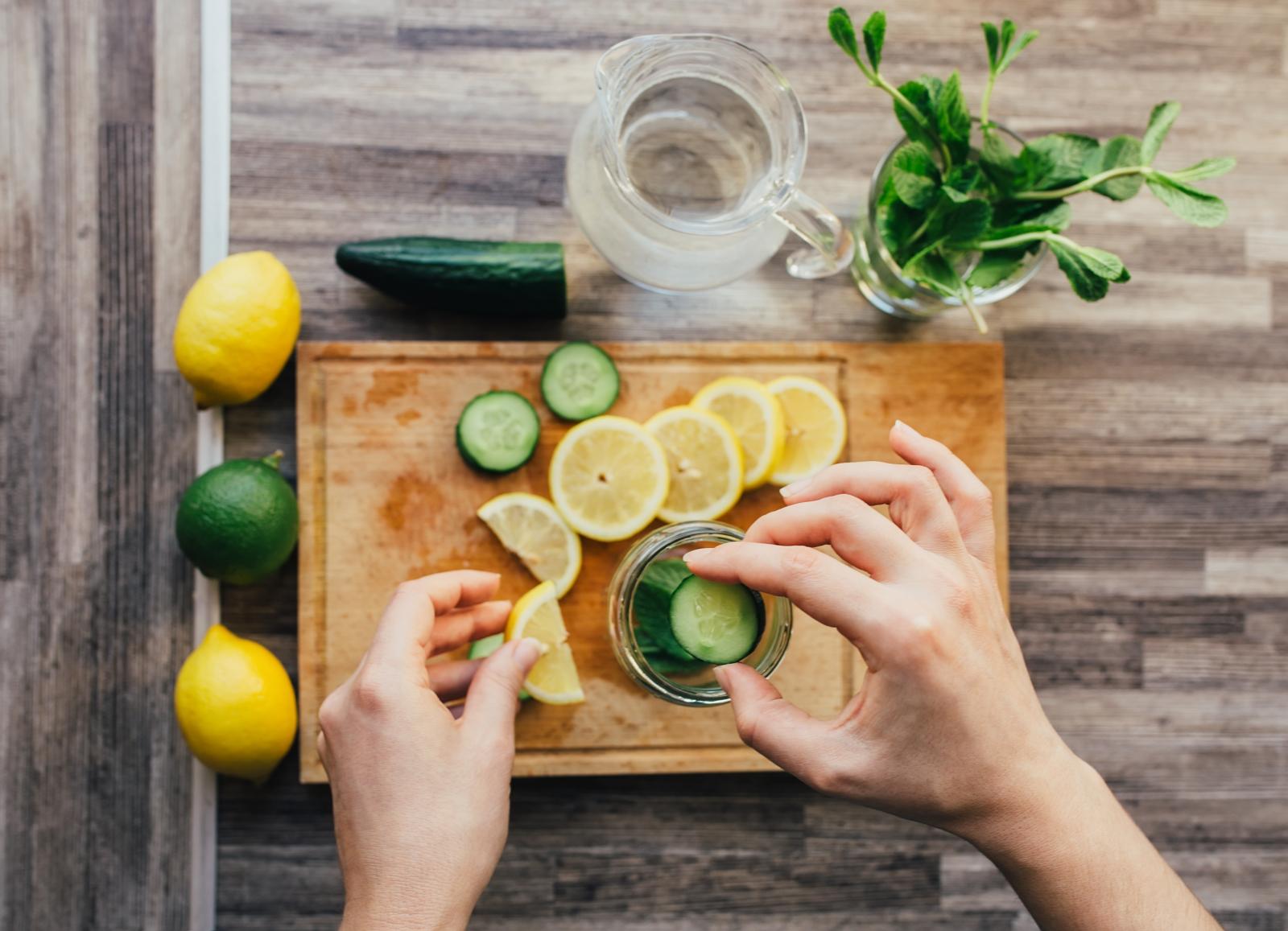Our bodies come equipped with several natural detoxification systems. Systems like our kidneys, bowels, sweat glands, lungs, and liver all work to remove toxins we encounter everyday from our bodies. We can be exposed to pollution, toxins, and certain chemicals through the air we breathe, water we drink, and even the food we eat. Therefore, our kidneys, bowls, skin, lungs, and liver need to be in top working condition! Do you suffer from constipation? Perhaps you rarely sweat—guilty! These are examples of how stuck systems prevent optimal elimination of toxins.
Here are 5 tips to support your body's detoxification systems
1. Sweat!
Many chemicals can be stored in our fat cells. Exercise is a great way to shrink and change our fat cells, thus removing content and potentially removing contaminants from them in the process. They can also be eliminated through the skin via sweat—during exercise as well as sauna therapy.2 Sweat it out!
2. Eat well!
The liver is highly involved in the detoxification process. The following can support the liver in performing its detox pathways:
- Cruciferous vegetables (cabbage, kale, cauliflower, Brussels sprouts, bok choy, collard greens, and broccoli)
- Beets
- Pomegranate
- Green tea
- Flax seeds
- Artichoke
- Psyllium husk powder
Having adequate phytonutrients, vitamins, minerals, and antioxidants are also imperative for adequate detoxification. Get your fill of plant-based fruits and vegetables—the richer and more vibrant the color the greater the antioxidant load. Find ways to incorporate all the colors of the rainbow into your diet to ensure you are getting a variety of nutrients and antioxidants. Aim for your plate to contain 50-75% veggies (and some fruit) and the other 25—50% whole grains and/or protein source.
3. Breathe!
Deep breathing, meditation, yoga, and exercise are great ways to promote healthy and normal breathing patterns. If you are like me, you may often find yourself holding your breath or taking shallow “mini” breaths much of the day. Instead, we want to optimize the lungs ability to circulate oxygen to aid in the removal of unwanted contaminants. I love Dr. Andrew Weil’s 4-7-8 breathing technique that supports a deep breathing pattern.3
4. Hydrate!
Drink plenty of water throughout the day to help flush your kidneys. How much is enough, you ask? My naturopath is continuously encouraging me to drink half of my body weight in ounces of water a day. Which means, a person who is 150 pounds requires roughly 75 ounces of water a day. In general, drink enough fluid so that you rarely feel thirsty and your urine is colorless or light yellow.
5. Move it!
The bowels are critical in the detoxification process. A daily, formed bowel movement is important to promote healthy detoxification. Healthy bowel functioning also promotes the secretion and excretion of bile from the liver and gallbladder, which supports the detoxification process.
One way to maintain formed and healthy daily bowel movements is to increase dietary fiber, especially from fruits, vegetables, and ground flax seed.
Often, bowel related problems are bigger than fiber alone. My top two strategies to improve digestion are:
- Balancing intestinal flora by building up the good guys with probiotics and proper nutrition and eliminating problematic microbes with various treatments.
- Identifying food sensitivities through an elimination process or through IgG/IgA blood testing. The most common food sensitivities are dairy, gluten, eggs, soy, and corn—and, not far behind, nuts. Try eliminating one, some, or all of these foods for at least 3 weeks and see what happens with your digestion.
More reading: 8 Ways to Support A Healthy Gut—and Take Control of Your Health
In addition to detoxing the body, don’t forget to limit your exposure as much as possible:
- Eat organic! Here is a link to the Environmental Working Group’s “dirty dozen” to help prioritize what fruits and vegetables to buy organic.
- Use skin care products without phthalates and parabens.
- Avoid plastic and nonstick pans. Choose glass, stainless steel and cast iron when able.
- Improve air quality in your home with plants that clean the air and make sure to open the windows often (yes even in the winter!) to help improve indoor air quality.
- Read food labels since an estimated 300 chemicals are found in processed foods.4 Aim to purchase food products with “real food” ingredients that you recognize.
References
- Dr. Marianne Marchese, 8 Weeks to Women’s Wellness: The Detoxification Plan for Breast Cancer, Endometriosis, Infertility, and Other Women’s Health Conditions, (Petaluma, CA: Smart Publications, 2011).
- Ibid.
- Andrew Weil, “Anti-Inflammatory Health with Andrew Weil, MD,” lecture, Institute for Integrative Nutrition, New York, 5 January 2015.
- Mike Adams, “Top 10 Food Additives to Avoid,” Hungry for Change, Retrieved 8 February 2016, http://www.hungryforchange.tv/article/top-10-food-additives-to-avoid.


